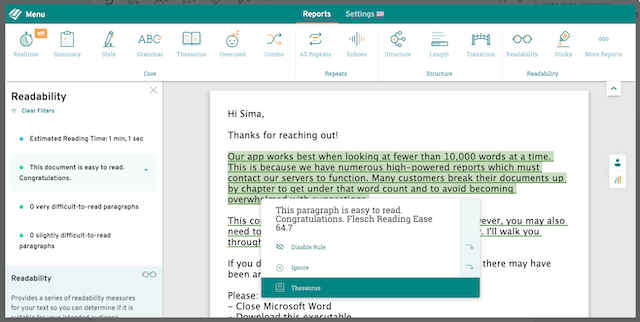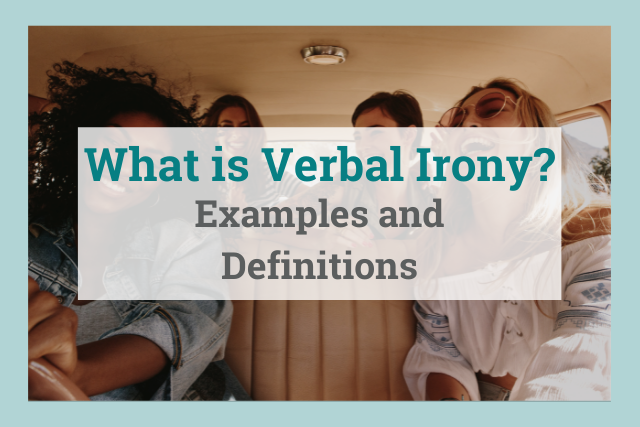
The word “irony” confuses many people and, in particular, what is meant by “verbal irony.” We often say we’re “being ironic” without actually knowing what this means. You probably learned about verbal irony at school, along with a range of other literary devices that are often (and incorrectly) used interchangeably.
We’ll clear up your confusion with an accurate definition of irony and, specifically, verbal irony, and provide a wide range of irony examples to help you understand and use it correctly yourself.
- What is Irony?
- The Three Types of Irony: Verbal, Situational, and Dramatic
- What is Verbal Irony?
- What are Ironic Similes?
- Why is Irony Often Confused with Sarcasm?
- How Do Non-Verbal Cues Support Verbal Irony?
- Is Lying a Form of Verbal Irony?
- How to Write Verbal Irony
- Verbal Irony in Literature
- Final Reflections
What is Irony?
Irony is when there’s a contrast between expectation and reality. It’s a commonly used literary device. Although irony is often used for comedy, it works effectively across all genres.
The word “irony” comes from an ancient Greek comic character called Eiron. He was a clever underdog who used his wit to bring down his opponent, the braggart Alazon, by underplaying his abilities. In ancient Greek theater, the eirôn became a stock character in comedy.
The original meaning of irony as a literary device meant “dissimulation” and “purposely affected.” Characters said less than they meant in a subtle underplaying of the truth. The meaning has changed over time and now irony means the opposite of what is expected.
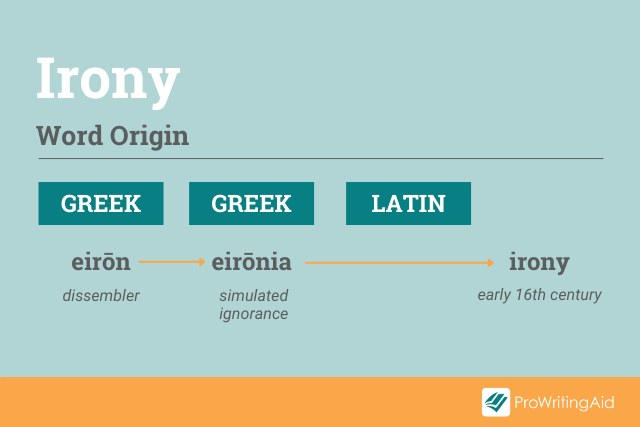
The Three Types of Irony: Verbal, Situational, and Dramatic
You may have heard there are three types of irony: verbal, situational, and dramatic. In fact, there are plenty of other types we’ll mention later, but these are generally regarded as the main three.
- Verbal Irony: a contradiction between what is said and what is meant.
- Situational Irony: the results of an action are the opposite of what was intended or expected.
- Dramatic Irony: When the audience knows something a character does not.
Let’s look briefly at the meaning of dramatic and situational irony to consider how they differ from verbal irony.
Situational Irony
Situational irony describes a complete difference between what is expected to happen and an actual outcome. The contrast between the expected results and reality is sharp and a contradiction, such as in the traditional story The Hare and the Tortoise.
We find another famous example in the hugely popular Harry Potter series. It leads the reader to believe that Harry will eventually kill Lord Voldemort. It comes as a surprise to discover that Harry must in fact allow Lord Voldemort to kill him in order for him to be defeated.
Dramatic Irony
You’ll see plenty of dramatic irony in plays, TV shows, movies, and novels. It occurs when you know something that the actor or character does not. This means their words have a particular significance they cannot possibly comprehend.
For example, let’s take a TV show set in a hospital. We see a doctor looking worryingly at medical notes. We can see the test shows a terminal diagnosis. Now it cuts to the patient surrounded by family members. “I’ll be out of here in no time!” she declares.
As the observer, we know things are far from okay for the poor patient. Dramatic irony is created because her words unwittingly are saying the opposite of what we know is going to happen.
Dramatic irony puts us one step ahead of the character, giving us an omniscient view of events. We know something they don’t. We can use this type of irony for huge laughs or the most tragic of stories (often known as “tragic irony”).
Think of how Shakespeare uses dramatic irony both for the tragic death of Romeo in Romeo and Juliet, and for hilarity when Titania falls in love with Nick Bottom in A Midsummer Night’s Dream.
Further Types of Irony
Although we often refer to the three types of irony, there are plenty of other types.
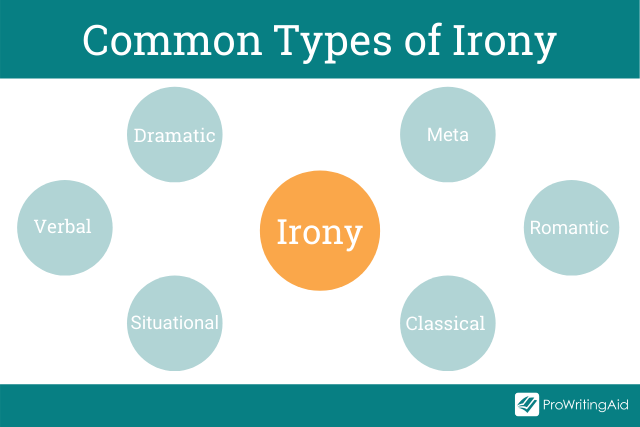
- Classical Irony: the original meaning of irony as shown in ancient Greek comedy.
- Romantic Irony: an author breaks the fictional illusion and shows their role in the composition of a text.
- Cosmic Irony: the contrast between the absolute of the world and the individual.
- Meta Irony: being ironic about being ironic.
- Comic irony: when irony is used to comedic effect, such as in satire.
What is Verbal Irony?
Verbal irony is found in plays, speeches, and literature when someone says something that is sharply different from the reality of the situation. Verbal irony, unlike dramatic and situational irony, is used intentionally by the speaker.
It can be hard sometimes to tell if a statement is verbal irony or not.
For example:
- A women falls down the stairs and cries, “I’m not hurt!” and tries her best to hide her mishap. This is not verbal irony.
- A woman falls down the stairs and cries, “I’m not hurt!” to communicate that she is indeed injured. This is verbal irony.
If you are unsure if something is verbal irony or not, look at the intent of the speaker. If they are deliberately saying the opposite of what they think or feel to highlight it, it’s verbal irony, like this example in the popular film Mean Girls.
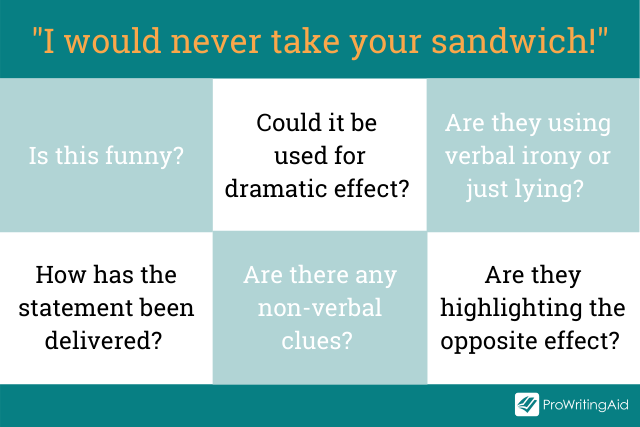
Verbal Irony Examples
Remember that verbal irony is used deliberately, often for comedy effect. We use it all the time, often without even realizing.
Real-life examples:
- Saying, “What a lovely day!” in the middle of a hurricane.
- Seeing your washing machine has broken and saying, “That’s just fantastic!”
- After a bad date, telling your friends, “My favorite part was when she spilled her wine all over my lap.”
- You ask for a quick break and your boss shouts, “Sure! It’s not like we’re busy or anything!”
Any time you say the opposite of the truth intentionally for effect, that’s verbal irony.
What are Ironic Similes?
Ironic similes are a type of verbal irony. In a typical simile, we make a comparison using the words “like” or “as” to highlight a particular element. For example, you might say that a basketball player is “as tall as a mountain.”
Ironic similes compare something using the complete opposite to highlight an incongruity.
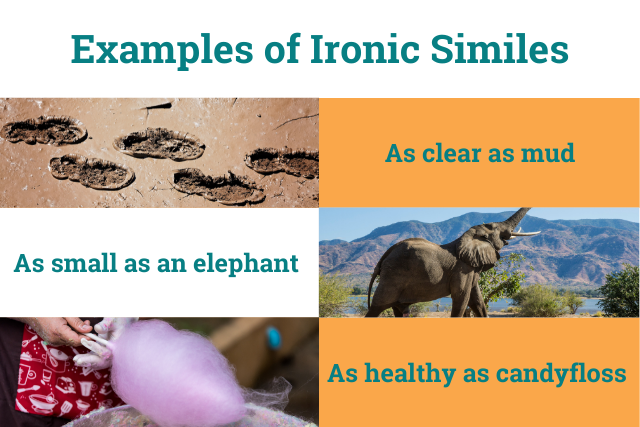
Ironic similes are an example of verbal irony because the effect created is deliberate. They work because the audience knows mud is not clear, even baby elephants are big, and trips to the dentist are rarely fun.
Why is Irony Often Confused with Sarcasm?
Irony and sarcasm are commonly confused because they are linked. However, sarcasm is not considered a literary device. Many people regard it as sharing elements of verbal irony or as a sub type.
So, how can you tell the two apart? Sarcasm, like verbal irony, means saying the opposite of reality. However, sarcasm is sharp and designed to ridicule or hurt. Verbal irony usually does not and often describes a situation rather than a specific individual.
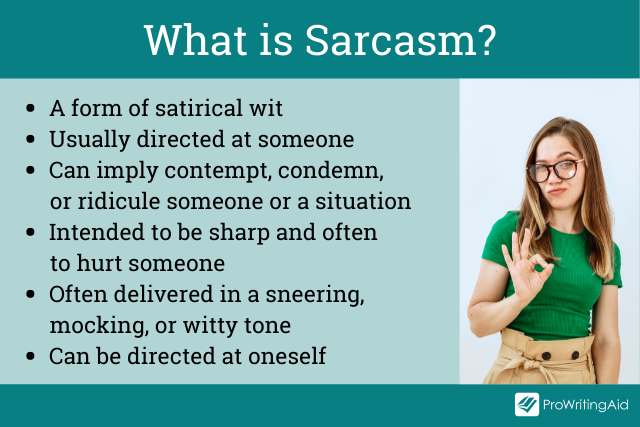
For example:
- Your manager sneers at you and says, “Well you never make mistakes at work, do you?”
As the comment is personal and intended to hurt, you can see this is sarcasm.
How Do Non-Verbal Cues Support Verbal Irony?
To show that verbal irony is being used, the speaker may give clues (called "non-verbal cues") to help the person they are speaking to understand that they are speaking ironically.
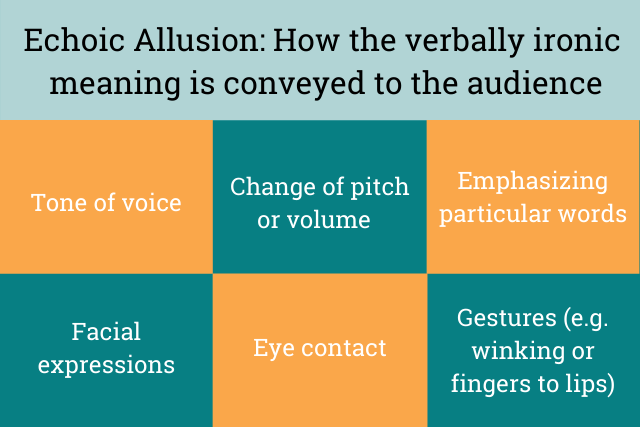
For example:
- Reham walks into her office staffroom. She catches Tom standing close to a platter of cookies someone has left out to share. Tom makes eye contact with her, covers his mouth with his hands and says, “I am definitely not eating a cookie.”
In this example, Tom’s body language and emphasis he puts on the word “definitely” shows he clearly is eating a cookie but is pretending not to in an amusing way. These non-verbal cues help explain that he’s being ironic.
Is Lying a Form of Verbal Irony?
As verbal irony involves saying one thing but meaning another, you’d be forgiven for thinking this is the same as lying. However, there is a difference.
For example:
You might say, “I didn’t take the last cake,” if you did, but don’t want to get caught. To be more convincing, you could put your hands behind your back, shake your head, or look confused. You are lying.
If you’re using verbal irony, you want the other person to know that you did indeed take that last cake. You might slyly smile, wink, and spread your hands wide in an exaggerated show of innocence. This is verbal irony.
If you lie, you’re intending to deceive and hoping not to get caught. Verbal irony is intentional, and it’s clear you are not telling the truth.
How to Write Verbal Irony
We often use verbal irony in speech, because we share much meaning via the delivery. Without the non-verbal cues it’s harder to spot verbal irony in text.
These three tips will help you use it effectively in fiction writing:
1: Use Description
As the reader can’t see a character speaking, you can add in extra description and/or effective verbs to make the meaning more clear. Just don’t overdo it, as it will slow down the pace of dialogue.
For example:
- “I would never do that!” he smirked.
Using the verb “smirked” highlights that he is not trying to lie, and the extra emphasis on “never” reinforces the impression that this is verbal irony.
- “I would never do that,” she said, her face cocked to the side in a display of mock-innocence.
The non-verbal cues, with the character putting her head on one side coquettishly, are used to highlight this is verbal irony.
2: Think of Character Intent
Knowing how characters are feeling, their personality, and the way they interact with others will help you identify whether they typically use verbal irony.
While verbal irony is commonly used, it’s less suitable for formal occasions or used towards someone in a more senior position. We also are less likely to use it towards strangers or in an unfamiliar setting.
3: Exaggerate the Verbal Irony
While we all want to write subtle prose, sometimes you’ll need to be a little more obvious to make the verbal irony clear.
Just emphasizing a particular word, adding in a non-verbal cue, or exaggerating the reaction to irony can help make it clear for your reader.
How Would You Use the Word “Irony” in a Sentence?
Let’s look at how you could use the word “irony” and its other forms accurately when writing.
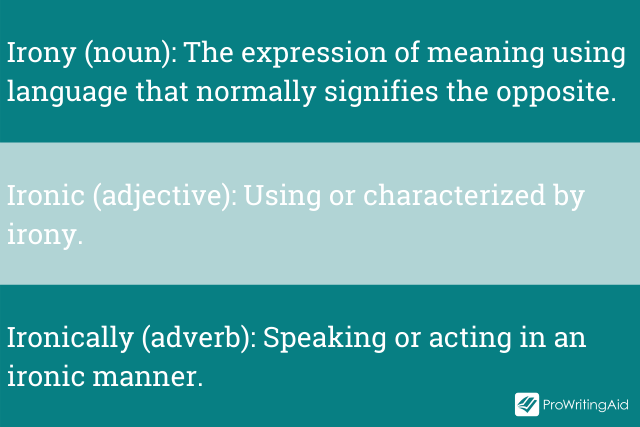
- Irony (noun): He uses irony to get his point across to the audience.
- Ironic (adjective): She always talks in an ironic way, so it’s hard to know if she’s being serious.
- Ironically (adverb): I didn’t mean it literally; I was speaking ironically.
While verbal irony is only one form of irony, it’s enough to say “irony” as a catchall without explaining which one you are using.
Verbal Irony in Literature
You’ll find verbal irony scattered throughout literature as it’s a commonly used device.
These are a few famous examples:
"But Brutus says he was ambitious; / And Brutus is an honourable man."
Julius Caesar by William Shakespeare.
Mark Antony appears to praise Brutus and the other assassins, while in reality he is condemning them.
"Today was a very cold and bitter day, as cold and bitter as a cup of hot chocolate."
Lemony Snicket: The Unauthorized Biography by Daniel Handler (pen name, Lemony Snicket).
This is an example of an ironic simile, as we know hot chocolate is warm and sweet, rather than bitter and cold. Ironic similes are one form of verbal irony.
"Yeah, Quirrell was a great teacher. There was just that minor drawback of him having Lord Voldemort sticking out of the back of his head!”
Harry Potter and the Order of the Phoenix by J. K. Rowling.
Harry makes it clear to his teacher that this was a major, rather than a minor drawback. This is also an example of sarcasm, as Harry is trying to ridicule Professor Umbridge.
Final Reflections
Verbal irony is a commonly used literary technique that we all use in everyday conversation. It’s used deliberately and can have a humorous or tragic effect.
Do be careful if you’re using verbal irony in prose. It’s hard to capture the subtlety of delivery that makes it effective. Used badly, it can make your writing hard to understand.
ProWritingAid has a wide range of checks you can use to improve the overall readability of your writing. It will spot errors and inconsistencies that could confuse your reader.
